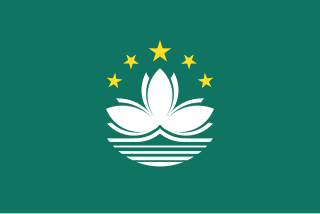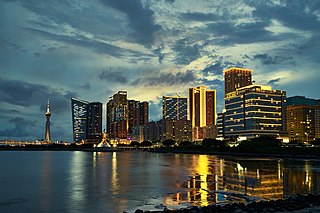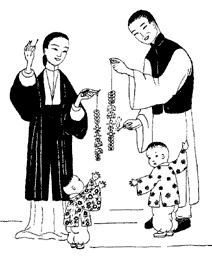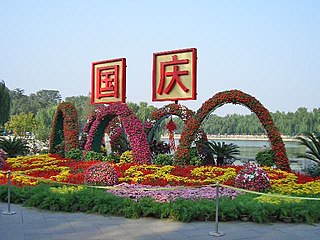
Labour Day is an annual day of celebration of the achievements of workers. It has its origins in the labour union movement, specifically the eight-hour day movement, which advocated eight hours for work, eight hours for recreation, and eight hours for rest.

Macau or Macao is a special administrative region of the People's Republic of China. With a population of about 710,000 people and a land area of 32.9 km2 (12.7 sq mi), it is the most densely populated region in the world.
Politics of Macau is a framework of a politically constrained multi-party presidential system, dominated by the People's Republic of China. It includes the legislature, the judiciary, the government, and a multi-party system. Executive power is exercised by the government, led by the Chief Executive.

The economy of Macau is a highly developed market economy. Macau's economy has remained one of the most open in the world since its handover to China in 1999. Apparel exports and gambling-related tourism are mainstays of the economy. Since Macau has little arable land and few natural resources, it depends on mainland China for most of its food, fresh water, and energy imports. Japan and Hong Kong are the main suppliers of raw materials and capital goods. Although Macau was hit hard by the 1997–98 Asian financial crisis and the early 2000s recession, its economy grew approximately 13.1% annually on average between 2001 and 2006. Macau is a full Member of the World Trade Organization. Public security has greatly improved after handover to the People's Republic of China. With the tax revenue from the profitable gambling industry, the Macau government is able to introduce the social welfare program of 15 years of free education to all Macau citizens. In 2015, Macau's economy saw a sharp decrease due to the reduced spending by visitors from Mainland China since the Anti-corruption campaign under Xi Jinping.

The National Day of the Republic of China, also referred to as Double Ten Day or Double Tenth Day, is a public holiday on 10 October, now held annually as national day in the Republic of China. It commemorates the start of the Wuchang Uprising on 10 October 1911 which ultimately led to the establishment of the Republic of China on 1 January 1912, and the collapse of the imperial Qing dynasty, ending 2,133 years of imperial rule of China since the Qin dynasty. The day was once held as public holiday in mainland China during the Mainland Period of the ROC before 1949. The subsequent People's Republic of China continues to observe the Anniversary of the Xinhai Revolution at the same date but not as a public holiday, which emphasize more on its revolutionary characteristics as commemoration of a historical event rather than celebration to the founding of the Republic of China.

The Dragon Boat Festival is a traditional Chinese holiday that occurs on the fifth day of the fifth month of the Chinese calendar, which corresponds to late May or early June in the Gregorian calendar. The holiday commemorates Qu Yuan who was the beloved prime minister of the southern Chinese state of Chu during the Warring States period, about 600 B.C. to 200 B.C., and is celebrated by holding dragon boat races and eating sticky rice dumplings called zongzi, which were southern Chinese traditions. Dragon Boat Festival integrates praying for good luck and taking respite from the summer heat.

The Qingming Festival or Ching Ming Festival, also known as Tomb-Sweeping Day in English, is a traditional Chinese festival observed by ethnic Chinese in mainland China, Hong Kong, Macau, Taiwan, Malaysia, Singapore, Cambodia, Indonesia, Philippines, Thailand, and Vietnam. A celebration of spring, it falls on the first day of the fifth solar term of the traditional Chinese lunisolar calendar. This makes it the 15th day after the Spring Equinox, either 4, 5 or 6 April in a given year. During Qingming, Chinese families visit the tombs of their ancestors to clean the gravesites and make ritual offerings to their ancestors. Offerings would typically include traditional food dishes and the burning of joss sticks and joss paper. The holiday recognizes the traditional reverence of one's ancestors in Chinese culture.
Public holidays and statutory holidays in Hong Kong are holidays designated by the Government of Hong Kong. They allow workers rest from work, usually in conjunction with special occasions. Public holidays in Hong Kong consist of a mix of traditional Chinese and Western holidays, such as Lunar New Year, the Mid-Autumn Festival, and the Dragon Boat Festival, along with Christmas and Easter. Other public holidays include National Day and Hong Kong Special Administrative Region Establishment Day.
Macau is an autonomous territory within China. A Portuguese colony until 1999, Macau has a diverse culture firmly rooted in Cantonese culture, with a mix of influences from East Asia and Western Europe. Macau is known for being the largest gambling center in the world.

Public holidays in Malaysia are regulated at both federal and state levels, mainly based on a list of federal holidays observed nationwide plus a few additional holidays observed by each individual state and federal territory. The public holidays are a mix of secular holidays celebrating the nation and its history, and selected traditional holidays of the various ethnic and religious groups that make up the country.

There are currently seven official public holidays on Mainland China. Each year's holidays are announced about one month before the start of the year by the General Office of the State Council. A notable feature of mainland Chinese holidays is that weekends are usually swapped with the weekdays next to the actual holiday to create a longer holiday period.

The Solemnity of the Immaculate Conception celebrates the Immaculate Conception of the Blessed Virgin Mary on 8 December, nine months before the feast of the Nativity of Mary on 8 September. It is one of the most important Marian feasts in the liturgical calendar of the Latin Church.

Buddha's Birthday or Buddha Day is a primarily Buddhist festival that is celebrated in most of South, Southeast and East Asia, commemorating the birth of the prince Siddhartha Gautama, who became the Gautama Buddha and founded Buddhism. According to Buddhist tradition and archaeologists, Gautama Buddha, c. 563-483 BCE, was born at Lumbini in Nepal. Buddha's mother was Queen Maya Devi, who delivered the Buddha while undertaking a journey to her native home, and his father was King Śuddhodana. The Mayadevi Temple, its gardens, and an Ashoka Pillar dating from 249 BCE mark the Buddha's birthplace at Lumbini.

The Macao Special Administrative Region of the People's Republic of Chinapassport is a passport issued to Chinese citizens who are permanent residents of the Chinese Special Administrative Region of Macau.
Events and festivals in Macau.

The Leal Senado Building was the seat of Portuguese Macau's government. It is located at one end of the Senado Square in São Lourenço, Macau, China. It currently houses Macau's Municipal Affairs Bureau.

Macau – United States relations are bilateral relations between Macau and the United States.

The following outline is provided as an overview of and topical guide to Macau:

Lesbian, gay, bisexual, and transgender (LGBT) persons in Macau, a special administrative region of China, face legal challenges not experienced by non-LGBT residents. While same-sex sexual activity was decriminalized in 1996, same-sex couples and households headed by same-sex couples remain ineligible for some legal rights available to opposite-sex couples.














